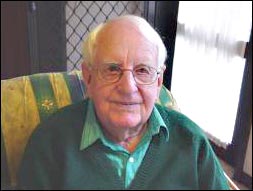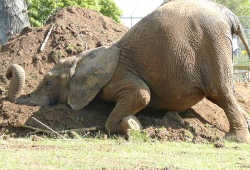The Rev Professor Ian Dixon – 05/06/03
In World War 2 I served as a chaplain with the New Zealand Division from 1942 onwards and served in the Italian campaign in the latter stages. Instead of returning to New Zealand I was sent as chaplain to the New Zealanders serving in the forces of occupation in Japan. That was how I chanced to be in Hiroshima shortly after the atomic bomb was dropped on the city.
|
|
| The Rev Professor Ian Dixon |
Avoiding Anzac Day observances I didn’t go to Anzac services for years and years unless I was asked to conduct the service. I didn’t like the observance of Anzac personally because it was just bringing back a lot of memories that I did not want to deal with and because although people said that they hated war there was an undertone of glorification of war and heroism.
The role of the Returned Services Association I joined the RSA (Returned Services Association) when I first came back from the war, and I resigned from it in 1949 when it had so much political clout that it forced the New Zealand Government into taking part in the Korean War. I considered that the Korean War was a very bad thing and that New Zealand should not just be following suit with war after war. I believed that it was because of the RSA’s influence that we got involved not only in the Korean War, but subsequently in the Vietnam War. I used to make a deliberate choice to do something else on Anzac Day.
We have to remember that when we came back from the war virtually nobody wanted to hear about it. That is why men did not talk about it and why they found the fellowship of the RSA so important. They could meet on Anzac Day and reminisce together in a way that they couldn’t with anybody else. I appreciate and applaud that fact.
People’s reluctance to hear about Hiroshima It’s only in the last twenty years – perhaps even less – that people have been prepared to discuss the actual result of World War 2 because that war ended with the atomic bomb. America thought that dropping the bomb was the right and proper thing to do, but I tell people often that absolutely nobody wanted to hear about Hiroshima when I came back from Japan. The sight of Hiroshima was the most horrifying experience that I have ever had in my life – an experience that I have never got over. Even my dear wife did not want me to talk about Hiroshima. She changed the subject and made a cup of tea.
Changing attitudes That’s how it was until, seemingly all of a sudden, people became aware of the fact that the nuclear bomb did actually explode somewhere, as it did in Hiroshima and Nagasaki. Then they were willing to talk about it. At long last I was free to express my feelings about Hiroshima without people wanting to change the subject.
In the late 1970s I was a visiting professor at Lancaster Theological Seminary in Pennsylvania where the faculty were very liberal-minded people, social activists and good scholars. When August 6 was coming up they said they wanted to organise a ‘quiet day’ where we could meet together and think and pray about the awfulness of the nuclear bomb. Of course I went along with them and sat silently through most of the sessions of the day and just listened.
As the afternoon wore on somebody said, “Ian, you haven’t spoken.”
I said “I don’t suppose you knew that I actually was in Hiroshima shortly after the bomb. I went out from Italy with the first draft of the army of occupation and I must have been one of the few who saw Hiroshima at that time.”
Then I went on to speak as I felt about it.
“The sight of Hiroshima is something I don’t think anybody can describe because it is out of this world. It shouldn’t be in this world because I have learned that reversing the use of nuclear energy is like reversing the act of creation.”
I started to describe Hiroshima as I saw it and then I became aware that most people were hoping that I would stop, because even these liberals at that stage didn’t really want to hear. It was too soon. If I were back there now they would be writing down every word I said. It’s a change – a world change.
To accept what happened at Hiroshima is to become an ardent peace activist.
Recently I was asked to speak briefly about Hiroshima at St Andrew’s College at their weekly chapel service. Just before the service began I noticed that they had some slides of Hiroshima on a huge screen. I realised that it was what the students would be looking at as I talked to them, but I was nearly physically sick. I couldn’t bear to see it. Of course I didn’t censor it. I realised it was put there for a purpose and it was right that they should look at the slides. They listened to me and I knew that what I was saying to them was heard by them – and it couldn’t have happened a few years ago.
Hearing the news in 1945 When the bomb first went down the part of the New Zealand Division that I was with had moved from Trieste to Assissi and camped there. I can never forget. We were standing outside our mess tent waiting for the call to lunch and we were listening to the midday news from the BBC. The very correct English voice announced to us that the Americans had put down an atomic bomb on the city of Hiroshima.
At that moment I didn’t know a thing about atomic bombs but I was standing beside a young officer who was emotionally very deeply upset at that news. I took it on myself to find out what was going on.
“This is the end of the world. The atom represents the fundamental element in creation,” he said.
When the war broke out he had been at university doing an Honours degree studying nuclear fission and had read up what was known about the topic and worked out in his mind that if that was turned to a war weapon it would be terribly and insidiously destructive. Not only would it be used, but other nations would copy it and nuclear scientists would develop it – which is exactly what happened. He was upset because the news gave him a glance into the future which few others would comprehend.
To others hearing about the atomic bomb it meant that the Japanese would capitulate. I subsequently learned – though I have never been able to verify it – that the Japanese had sued for surrender before the bomb was dropped.
An unexpected visit to Hiroshima I had no idea of what my future would be, but after a time I was told that I was going to Japan with the first draft of the occupational force. I was so wanting to go home as the war was over, but I went to Japan. I had never heard of Hiroshima before the bomb was dropped and I didn’t even trouble to find out where it was.
Our troopship came into a former Japanese naval port and after a few hours we were put on a train. The first place where it stopped was Hiroshima. It stopped for a long time. That is when the bottom of the world just dropped out for me. It influenced those I was with so much that I remember we couldn’t talk about it. I saw shadows on the ground, but I didn’t realise until long afterwards that they were the shadows left by people who simply dissolved. When we got back on to the train it seems to me now that we went for miles and miles and miles and just looked at blackened scenery.
I tell people that this little bomb had obliterated everything between Christchurch and Geraldine. I may not be accurate but that is my lasting impression that I have lived with.
People marching for peace today Now the world is beginning to see the awfulness of modern war and that is why when the Iraq war was in prospect millions and millions of people all over the world marched against the war. Humanity today is really marching against war – and it has to.
What it has to start marching about now is that modern armaments are being manufactured and supplied to any country that wants to buy them. Britain, America, France and Germany are the biggest manufacturers of this stuff, and America has sufficient nuclear weapons that it could destroy the planet several times over.
I think that it is why people are now going to Anzac services. I think what happened in Gallipoli is now fading into the distance. It’s not that we should fail to remember and protest against the ghastly mistake that was made and which we call Gallipoli. I think humanity is getting ready to outlaw war, and the hope is that if that is achieved peace will break out.
This will depend on whether the armament magnates can relinquish their millions – their huge estates in the suburbs and the islands they can buy up and the wonderful yachts they are able to sail in.
The question now is whether we allow the dollar to be our ruler or keep on suing angrily for peace. We’ve got to be angry and our anger has got to turn away the threat of war. Whatever had to happen or be done to Iraq the sophisticated armaments of the present day should not be the tool to deal with it. They should be positively ruled out for any use at all.




